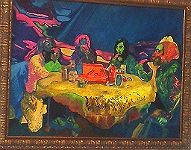On December 6, 1989 Mark Lepine/Gamil Gharbi entered the École Polytechnique in Montreal and shot dead fourteen women, and injured ten other women and four men. He later killed himself with a bullet through the head. The Canadian media, and especially feminists, commemorate December 6 as a day to bring awareness to violence against women. It is quite a sacrilegious day.
Barabara Kay, in her December 30th National Post article, writes that this day has finally lost its lustre of "blame the men day," and cultural trends are indicating the demise of feminism - at least the "hate men" variety.
Here is a take on the incident by Mark Steyn:
M. Lepine was born Gamil Gharbi, the son of an Algerian Muslim wife-beater, whose brutalized spouse told the court at their divorce hearing that her husband 'had a total disdain for women and believed they were intended only to serve men.' At 18, young Gamil took his mother’s maiden name. The Gazette in Montreal mentioned this in its immediate reports of the massacre. The name 'Gamil Gharbi' has not sullied its pages in the 12 years since.The Canadian media, which still insists on calling Gharbi by his French name Lepine, missed the point, as does the usually insightful Barbara Kay. I've always associated Gharbi's killing spree with Muslim/Arab misogyny, something he learned from his father. What gives it away, in my opinion, is the chilling way in which he separated the men from the women - a practice common in Arab/Muslim culture in all aspects of society from mosque attendance to private parties - before shooting them.
Here’s where the dhimmis come in. He ordered fifty men in one class to leave, and shot dead the remaining nine women (and later on five more in his rampage around the building). Fifty men meekly left the room as a single man with a single gun ordered them to do so. Not one man risked his life for his fellow countrywomen, not one had it in him to disarm this murderer.
This is the story that Barabara Kay should be writing about, linking it with the Arab/Muslim story that it surely belongs to, and how it is symbolic of Canada’s first (at least, first public) dhimmitude. Yes, feminism may be on the wane (although I doubt it), but dhimmitude is on the rise, with its accompanying increase in Muslim boldness.






